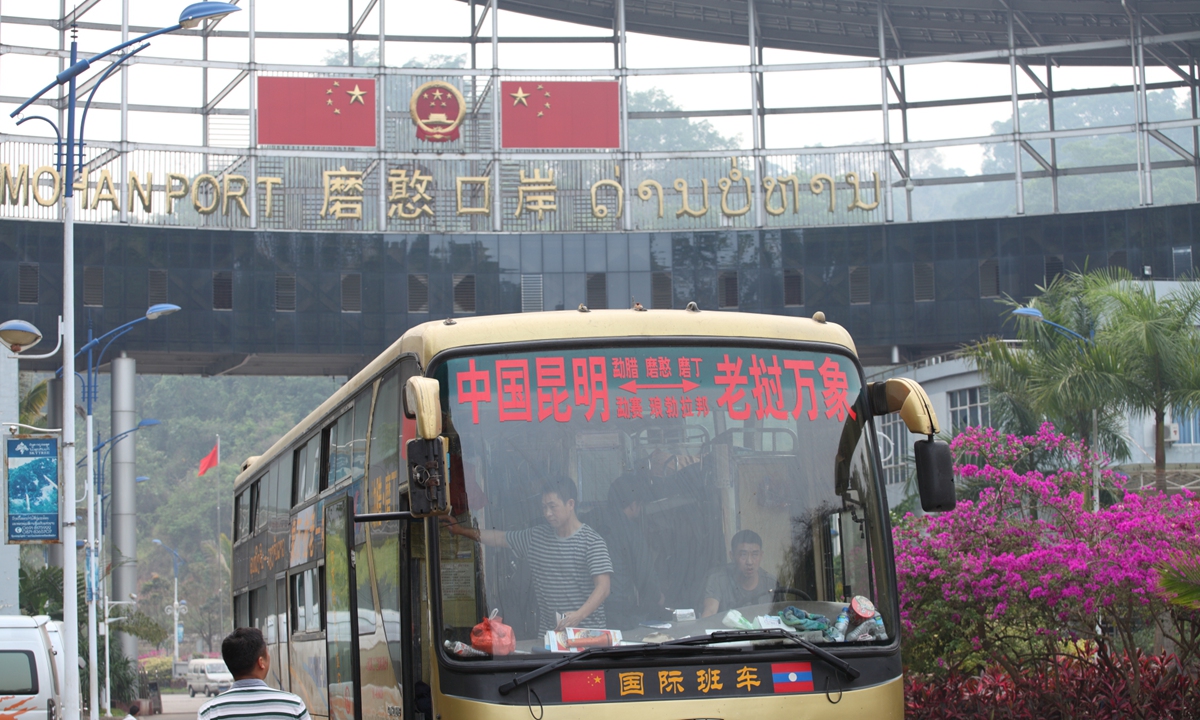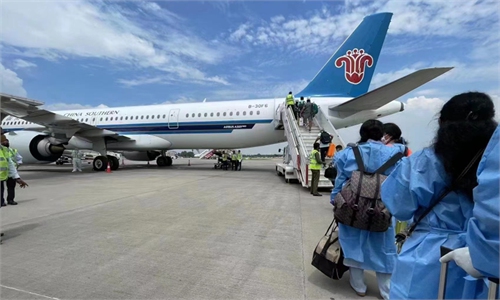
A cross-border shuttle bus at the Mohan Port in Southwest China's Yunnan Province on April 22, 2022. Photo: VCG
China mulls strengthening management of border travel, indicating the regions where many tourists have taken part in gambling may have their border tourism activities suspended or even terminated.
The announcement came as five departments, including Ministry of Culture and Tourism and Ministry of Foreign Affairs, said that they are collecting feedback for a revised draft policy on border tourism.
The draft encourages border areas to create distinctive tourism destinations, clarifies that border travelers can flexibly choose entry and exit ports, and simplifies past documents regarding border tourism, according to the announcement on the official website of the Ministry of Culture and Tourism.
It also clarified that the border agencies must not arrange tourism activities that involve obscenity, gambling or drug trafficking.
If a tour group member is punished for participating in gambling activities more than three times within a year, border tourism activities in the area would be suspended or even terminated, the draft document read.
If a member of a foreign tour group illegally enters an area beyond the tourism cooperation agreement or stays in China illegally, the border agency shall promptly report it to the public security and tourism departments, the draft said.
The previous regulations, which were launched in 1997, have not adapted to the needs of the new situation, and some new problems that have been exposed in border tourism need to be regulated.
At issue include uncivilized tourist behaviors that are detrimental to the nation's interests and image, the ministry said, adding that some unqualified units and individuals operate border tourism businesses illegally.
The lack of compliance has disturbed the sustainable development of border tourism for a long time, especially regarding some illegal activities such as cross-border gambling in the guise of group tours, Cheng Chaogong, senior researcher of the Tongcheng Research Institute, told the Global Times on Monday.
"It is urgent for the government to launch updated measures to regulate the market," Cheng added.
The Global Times reported in August that the Chinese Embassy in Cambodia received more than 20 requests for help from scam victims from the Taiwan island and successfully assisted the Cambodian government to help some of them, after reports showed that some Taiwan residents were forced to join online gambling, telecommunications fraud and other illegal activities, and they were subjected to movement restrictions in Cambodia.
Market insiders took a welcoming attitude toward the proposed new regulations.
"They will have positive significance for improving the convenience of border tourism and the richness of tourism products. For example, Xinjiang may become a cross-border self-driving hub for Central Asia, while Yunnan and Guangxi will strengthen connections with Southeast Asian countries, and Heilongjiang will more effectively promote tourism to the Russian Far East," Ge Lei, the vice director of CYTS Research Institute, told the Global Times on Monday.
Dai Bin, director of the China Tourism Academy, said that the coming regulations will benefit cross-border tourism flows and travel agencies' business.
Border tourism has developed rapidly and has been the fastest growing segment of the outbound tourism market in the past two decades.
Border travel between China and Vietnam, Cambodia, Mongolia and Russia has been increasing year by year, Cheng said.
He highlighted that the convenient transport along the route of the Belt and Road Initiative also brings more border tourism, which will usher in a new stage of rapid development.

